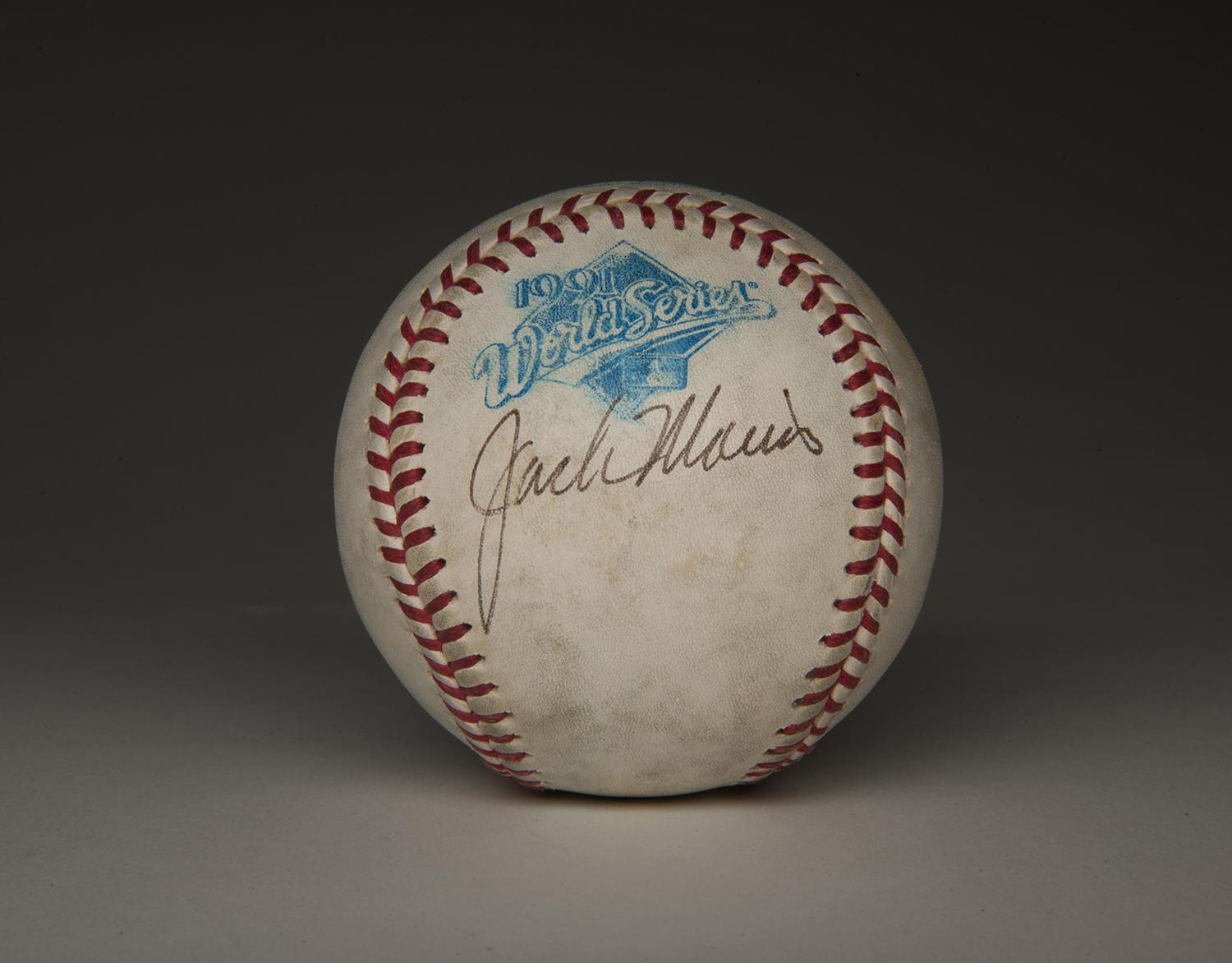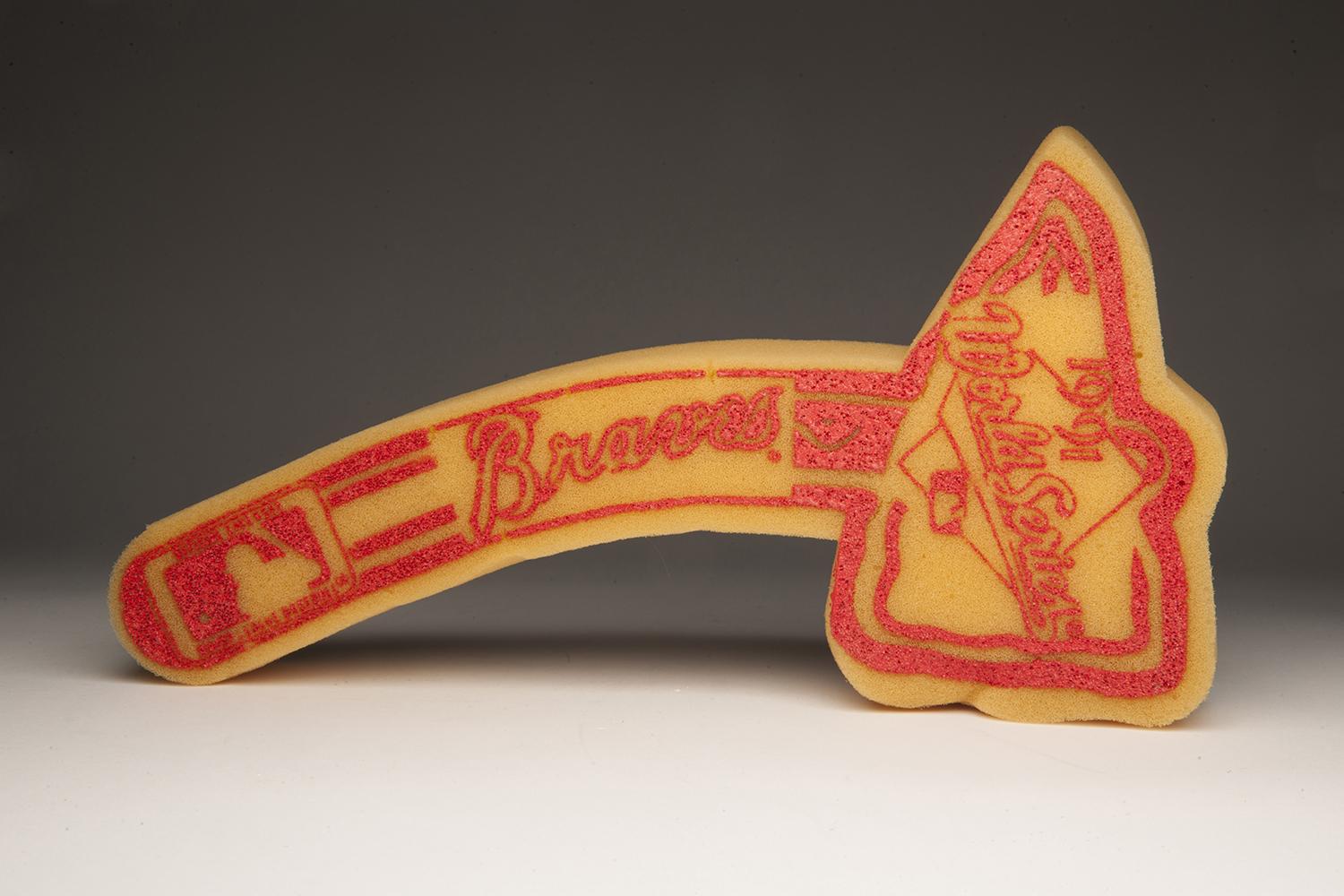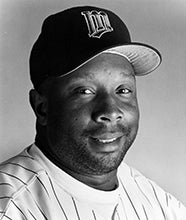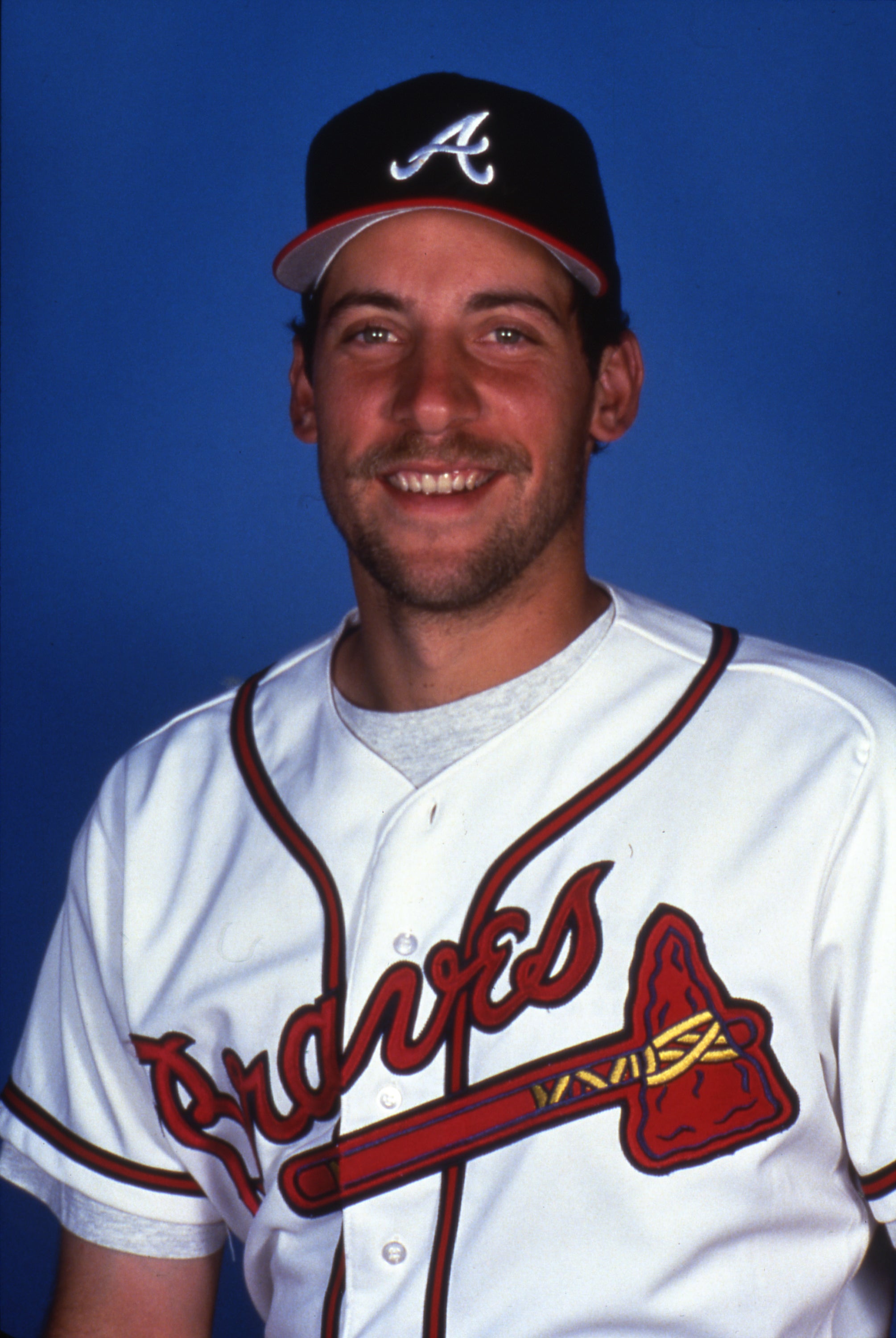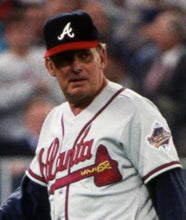- Home
- Our Stories
- Thrills of 1991 World Series remain fresh
Thrills of 1991 World Series remain fresh
In a drama that played out before baseball fans across the country 25 years ago, Jack Morris was the fearless leading man in a performance for the ages.
The seventh and deciding game of the 1991 World Series, pitting the Minnesota Twins versus the Atlanta Braves, was a thriller throughout. It was scoreless before its riveting climax, a walk-off hit in the bottom of the 10th by an unexpected hero, Twins infielder Gene Larkin, for the contest’s only run.
When it was all over, Minnesota’s Morris had gone 10 shutout innings in arguably one of the greatest postseason pitching performances in the game’s history.
Among the 1991 World Series items in the permanent collection of the National Baseball Hall of Fame and Museum are a baseball signed by Morris, the Series-winning ball hit by Larkin, and a ticket to Game 7.
The 1991 Fall Classic, which for the first time in history included a pair of teams that both had finished last in their division the previous season, was knotted at three games apiece when Game 7 took place on the night of Sunday, Oct. 27, in front a crowd of 55,118 at the Hubert H. Humphrey Metrodome.
In what turned out to be a classic pitchers’ duel between a pair of right-handed stars, the starters were the 36-year-old Morris, the winningest pitcher in the 1980s, and the Braves’ John Smoltz, a 24-year-old future Hall of Famer.
Smoltz grew up in Michigan idolizing Morris, then pitching with the Tigers.
“What else can you say about Morris?” said Smoltz. “He did a super job. It’s what I saw in him all those years growing up in Detroit. He’s such a competitor. He’s never going to give you a chance to kick him over.”
Both Morris and Smoltz were pitching on three days’ rest, having also faced each other in Game 4, the Braves winning 3-2 when Mark Lemke, who had tripled with one out in the bottom of the ninth inning, scored two batters later on pinch-hitter Jerry Willard’s sacrifice fly.
In Game 7, Smoltz would end up tossing 7 1/3 scoreless innings, giving up six hits and one walk while striking out four. Relieved by Mike Stanton, who went 2/3 innings scoreless innings, Alejandro Pena would next enter the game for Atlanta and throw a scoreless ninth inning.
The deciding game’s lone run came in the bottom of the 10th inning with Pena still on the mound. Twins leftfielder Dan Gladden led off with a broken-bat double to short left-center, a sacrifice bunt by Chuck Knoblauch moved Gladden to third, and intentional walks to Kirby Puckett and Kent Hrbek loaded the bases.
Minnesota’s Gene Larkin, pinch-hitting for Jarvis Brown, who had pinch-run for DH Chili Davis in the ninth, ended the Series with a first-pitch single to deep left-center field over a drawn in outfield that scored a clapping Gladden, with thousands of white Homer Hankies waving in the high-decibel Metrodome crowd.
“I’d been in the locker room since the seventh inning, hoping my turn would come,” said Larkin, who drove in only 19 runs all season and was hobbled by leg injuries when he came to the plate in the 10th inning. “They kept passing me by, but I thought I’d get a chance in the late innings.”
When he finally got his opportunity, Larkin, who broke many of Lou Gehrig’s offensive records at Columbia University, claimed he wasn’t nervous.
“I was relaxed up there. All I was trying to do was get the ball up in the air,” said Larkin, who was batting for only the fourth time in the World Series and seventh time in 12 Postseason games. “I knew a fastball was coming. I just wanted to make contact and hit a fly ball. As soon as I hit it, I knew the game was over and that we could relax and enjoy the world championship.
“It was incredible. This has to go down as one of the best World Series of all time. You have to give the Braves a lot of credit. You have to give Jack Morris a lot of credit. It was an unbelievable performance. He’s a gutty performer, a hard-nosed guy. He did a tremendous job.”
As for Morris, he lived up to his reputation as one of the game’s great big-game pitchers. He pitched a complete-game shutout, going all 10 innings while giving up seven hits and two walks while striking out eight. Of his 126 total pitches, 79 were strikes.
“Somebody had to go home a loser but nobody was a loser,” said Morris, who improved to 4-0 lifetime in the World Series and 8-1 in the Postseason. “Two of the greatest teams fought so hard throughout the Series. Somehow we ended up winning this thing. It’s great to be a part of. It’s great to be on a team that persevered for so long and played so hard all year long.
“It still hasn’t sunk in yet. It was a classic in every aspect. Just a flat-out beautiful ballgame,” added Morris, who won two games for the Tigers in the 1984 World Series, helping his team defeat the Padres in five games. “We both had our opportunities and we both managed to get out of it.”
The World Series MVP Award went to Morris, who started three games, finished with a 2-0 record and a 1.17 ERA in 23 total innings in helping the Twins win their second World Series title in five years.
“He’s (Morris) tough, mentally and physically: he really knows what he’s doing out there on the mound,” said Lemke, who batted .417 in the Series. “You’re not going to get away with blowing too many scoring opportunities against Jack. He seems to get stronger as the game goes on.”
Morris, a native of St. Paul, Minn., signed a one-year free-agent contract with the Twins prior to the 1991 season after having spent his first 14 big league seasons as one of Detroit’s top starters.
“(Twins manager Tom Kelly) told me I was out of the game in the ninth inning,” Morris said. “I told him I got a lot left in me.”
“I told him after the ninth, ‘That’s enough, Jack,’” Kelly said. “He said, ‘TK, I’m fine. I’m fine.’ I said, ‘You did enough. It’s time for the boys to carry some of the load. He said, ‘TK, I’m fine. I’m REALLY fine.’ Then Suchy (pitching coach Dick Such) came by and said, ‘He’s fine. He really is.’
“And I said, ‘What the hell. It’s just another game.’”
For the Braves, this was the first time they had appeared in a World Series since the franchise shifted to Atlanta in 1966.
“We had some opportunities to win,” said Braves manager Bobby Cox. “We just didn’t get the big hit.”
“It’s tough right now to realize what we accomplished, especially with another team over there celebrating,” said Smoltz. “You can only dodge so many bullets. The bottom line was, who was going to run out of their nine lives first.”
Both teams had chances to score earlier in the game, the Braves leaving eight men on base and the Twins 12.
In the top of the eighth inning, the Braves loaded the bases with one out but Morris got Sid Bream to ground into a first-to-home-to first double play. Earlier that inning, Lonnie Smith’s base-running mistake, fooled by the Twins infielders that a throw was on its way, cost the Braves the go-ahead run when he didn’t score from first on a Terry Pendleton double.
“If I saw Pendleton’s ball off the bat, there’s a good chance I could have scored,” Smith said. “But I didn’t look in. That was my mistake.”
“I was surprised Smith stopped,” Pendleton said. “I thought he would score for sure. He lost the ball when he got to second. If you lose the ball here, you’re in double trouble.”
“Our instinct is to pretend we’re turning a double play,” said Twins second baseman Knoblauch. “Luckily, he stood there, even though the ball bounced off the wall, he stood at second base. He had no idea where the ball was.”
In the bottom of the eighth inning, the Twins loaded the bases with one out but Stanton got Kent Hrbek to line into a double play.
“I was nervous from the start, and then things got worse,” Hrbek said. “This whole Series was intense.
“I looked over at Lemke at second base in the last inning, right before Gene hit the ball. I grabbed my stomach and he grabbed his head. It was getting to us out there.”
Hall of Fame Membership
There is no simpler, and more essential, way to demonstrate your support than to sign on as a Museum Member.
Three games in the 1991 World Series – in which all seven games were won by the home team - were settled in extra innings and four times a game was won with the final swing. It was also the first 1-0 seventh game since the Yankees beat San Francisco in 1962.
“Every pitch, every strike, every ball, every inning – everything mattered in every game,” said Pendleton.
Morris may have put the 1991 Fall Classic in its proper perspective when he said, “Some day down the road, people will look at this and they’ll say: ‘What a Series!’ I can’t tell you whether it was the greatest, but I can tell you I’m damn proud to be a part of it.”
Bill Francis is the senior research and writing specialist at the National Baseball Hall of Fame and Museum
Related Stories
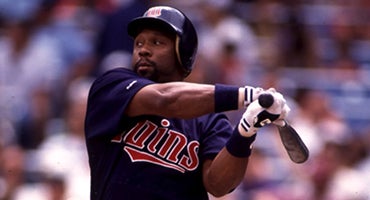
Kirby Puckett’s historic night powers the Twins to a win in Game 6 of the World Series
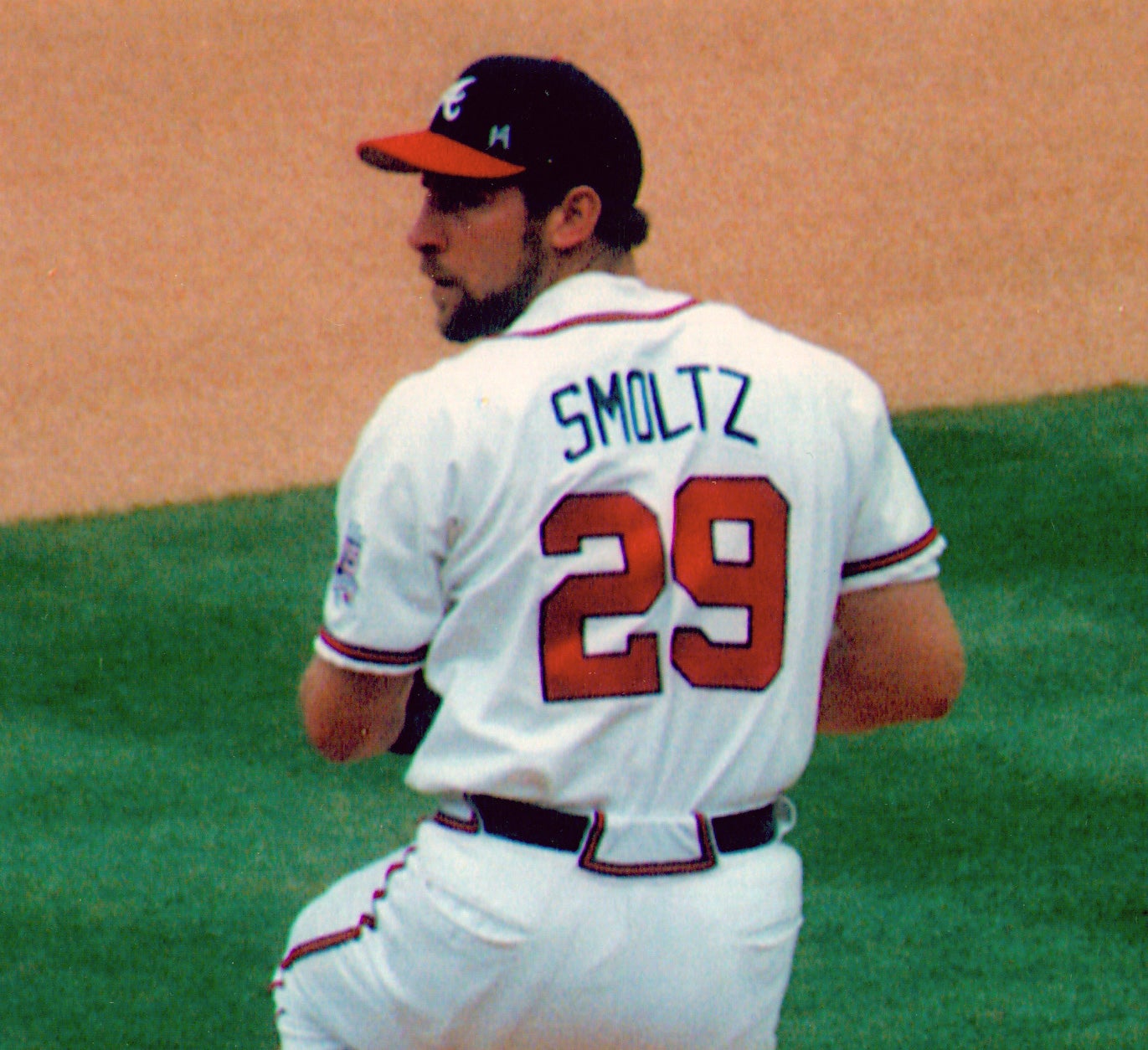
Tigers trade John Smoltz to Braves
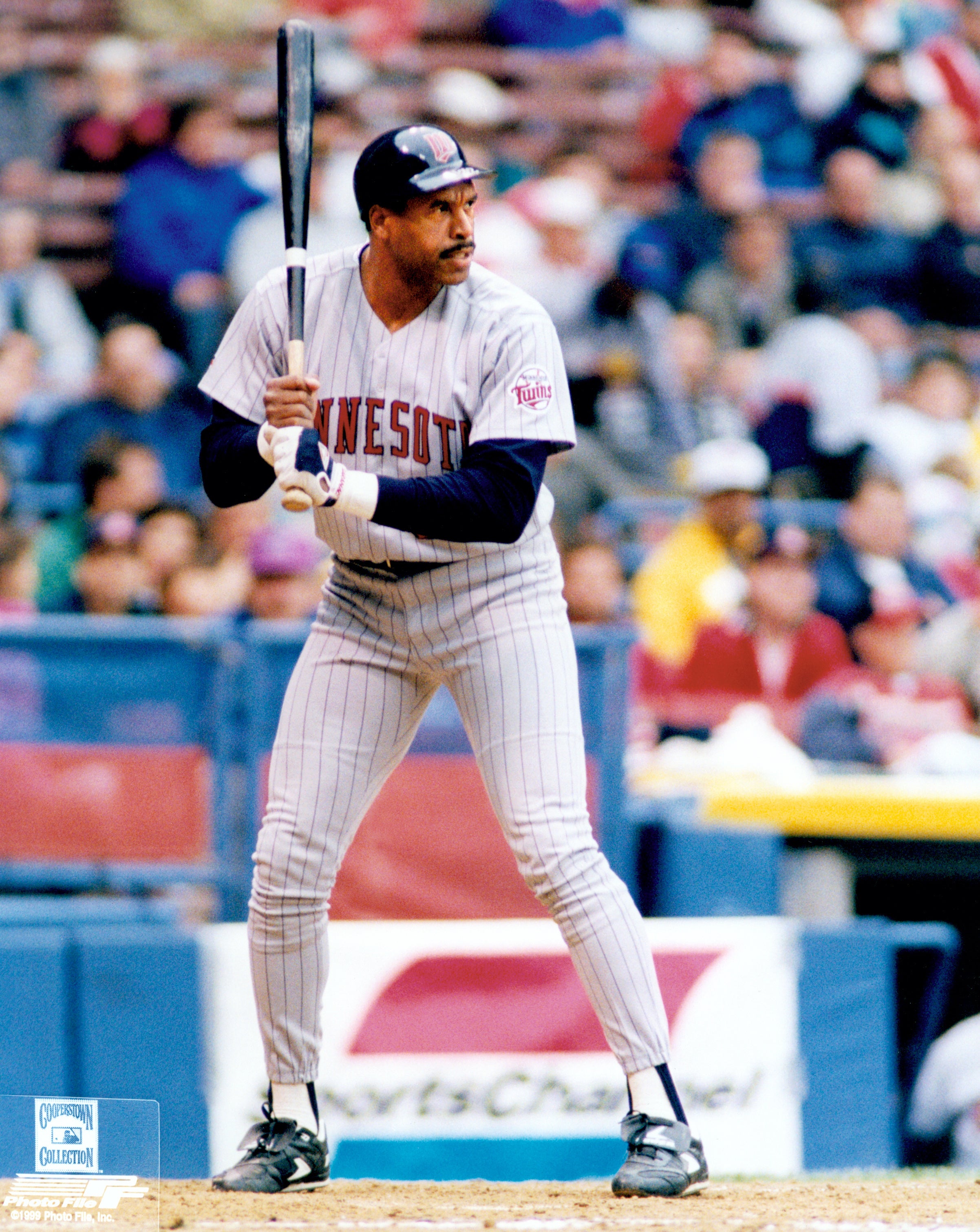
Dave Winfield signs with hometown Minnesota Twins
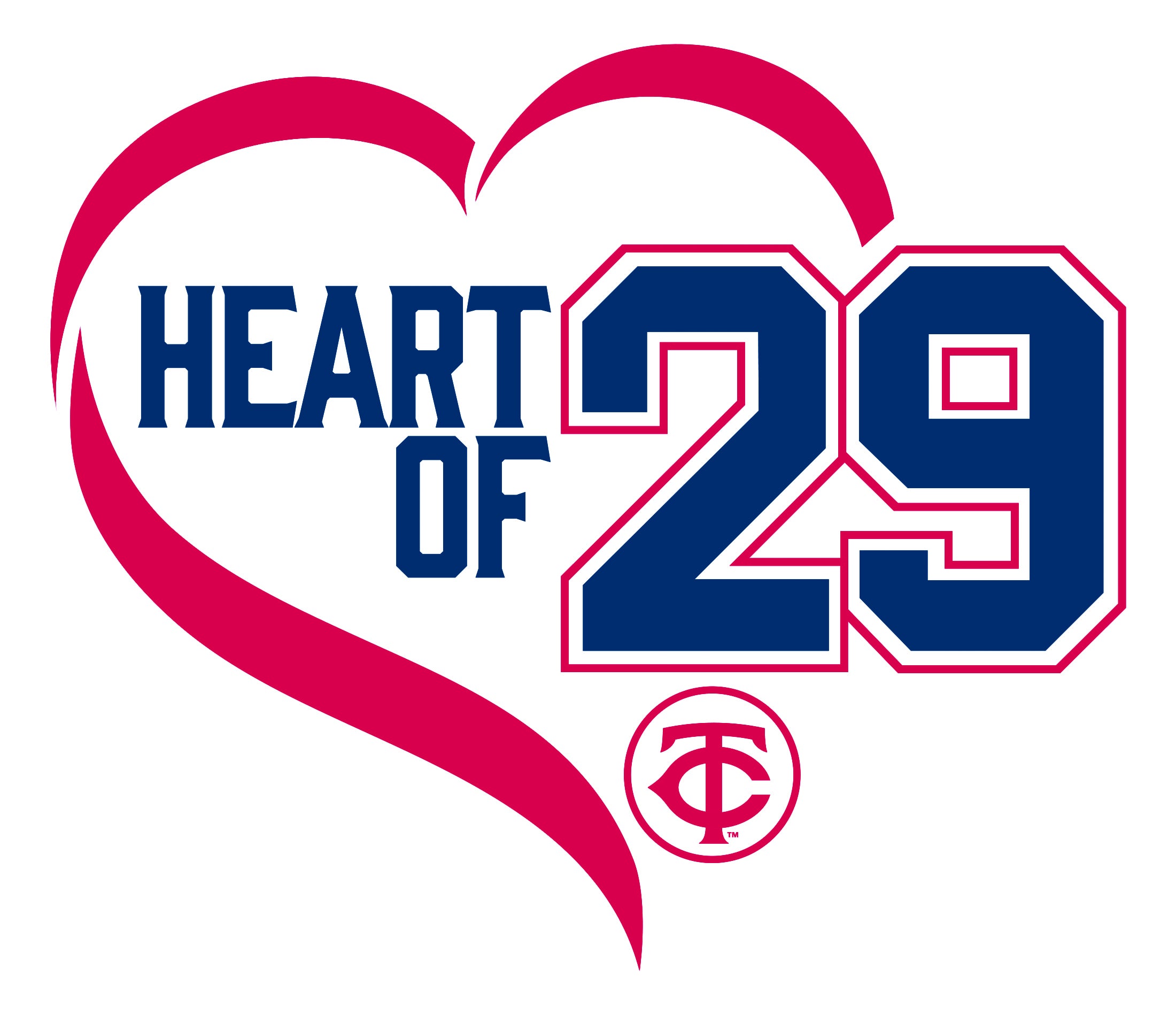
Twins honor Rod Carew with Heart of 29 campaign

Kirby Puckett’s historic night powers the Twins to a win in Game 6 of the World Series

Tigers trade John Smoltz to Braves

Dave Winfield signs with hometown Minnesota Twins



